Football fans have slammed Germany's players for 'only focusing on politics' in the build-up to their shock World Cup defeat by Japan on Wednesday.
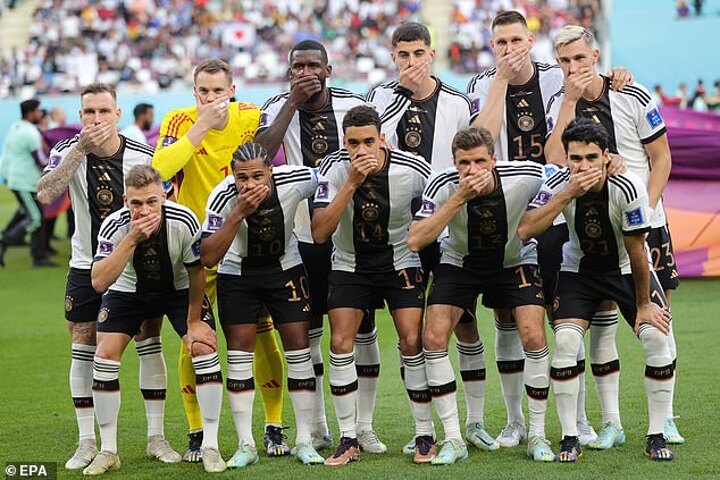
Germany's players made a statement in their pre-match team photo before their opening World Cup game with Japan as they covered their mouths in protest at being blocked from wearing an anti-discrimination armband.
It followed a joint statement from seven European nations, including Germany plus England and Wales, to drop plans to wear the 'OneLove' armband after threats of sporting sanctions from FIFA.
While Germany's players looked to make a political statement off the pitch, fans have accused them of failing to make a statement on the pitch, as they fell to a shock 2-1 defeat by Japan soon after.
Many fans insist Hansi Flick's men 'deserved' to lose for focusing 'only on politics', claiming they got 'sidetracked' in the process.
One fan wrote: 'Germany deserved that for being so obsessed with rainbow armbands and politics.'
Another said: 'Don't get sidetracked by the 'politics' and just play your football. All these needless virtue signaling isn't helping you win. Germany should've won this'




After the protest and as the match kicked off, the German Football Association (DFB) released an statement emphatically supporting its team, saying: 'To ban the armband is like banning our right to speak.'
Meanwhile, watching from the stands, Germany's Interior Minister Nancy Faeser wore the armband instead. She had hidden it underneath a pink blazer, which she took off as the game began - revealing the band and its heart-shaped logo.
Faeser was later seen sitting next to FIFA president Gianni Infantino with her armband proudly on display. They appeared to share a frosty exchange.
'We wanted to use our captain's armband to take a stand for values that we hold in the Germany national team: diversity and mutual respect,' the DFB said on Twitter. 'Together with other nations, we wanted our voice to be heard.'
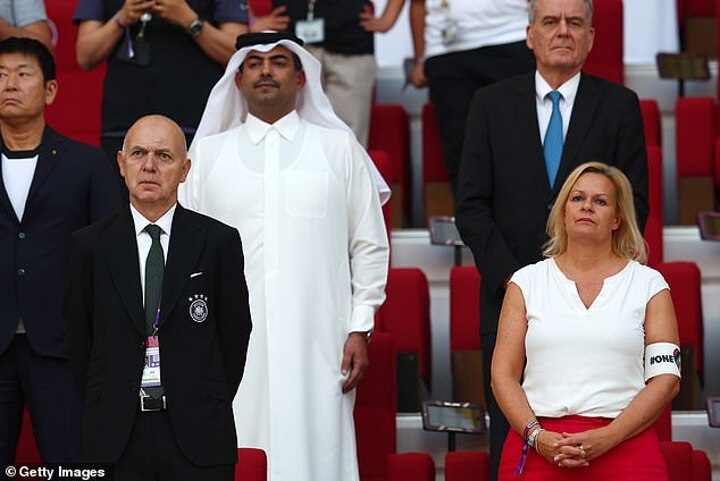
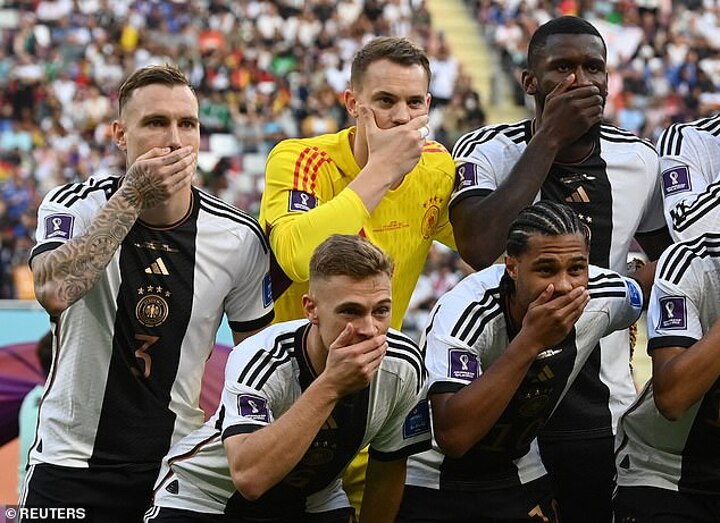
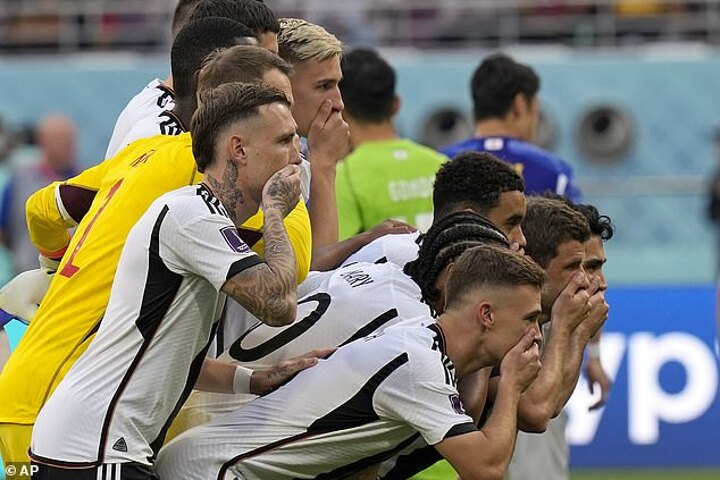
In a second tweet, DFB said: '[The gesture] wasn't about making a political statement – human rights are non-negotiable. That should be taken for granted, but it still isn't the case. That's why this message is so important to us. Denying us the armband is the same as denying us a voice. We stand by our position.'
FIFA had threatened seven European teams with sanctions if they wore the armband symbolising diversity and tolerance.
England, Wales, Belgium, the Netherlands, Switzerland, Germany and Denmark had said on Monday they had been put under pressure by FIFA, and abandoned the plans to wear the symbol in the conservative Muslim country.
It was initially reported that the sanction would take the form of a yellow card to the player wearing the armband, but reports later suggested FIFA had threatened further punishments to the players and teams should they opt to wear the armband.
Speaking before the game, Faeser said FIFA's ban was a 'huge mistake'.
Not only players, but fans should also be allowed to show pro-LGBTQ symbols 'openly', she told reporters in Qatar.
Security staff at the World Cup have ordered spectators to remove items of clothing featuring rainbow logos.
Supporters should however 'make a decision for themselves' about whether they wanted to wear the symbols, Faeser said.
German government spokesman, Steffen Hebestreit, said earlier in Berlin that FIFA's decision to bar captains from wearing the armbands was 'very unfortunate'.
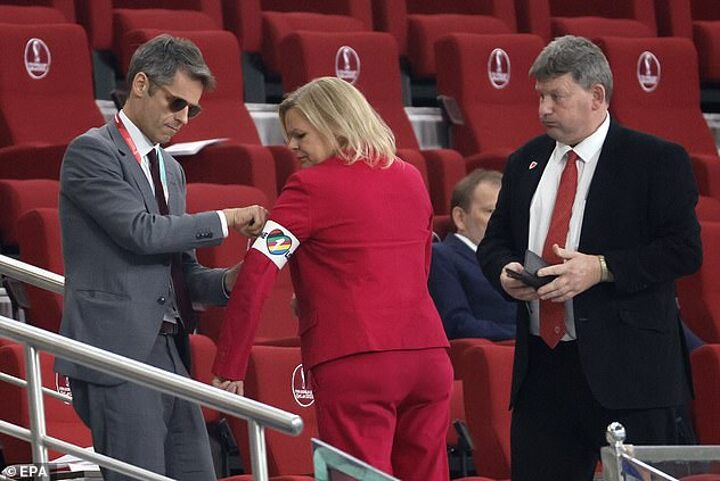
'The rights of LGBTQ people are non-negotiable,' Hebestreit said at a regular press conference, using similar language to the DFB statement posted on Twitter later.
The German FA announced yesterday that it is considering taking legal action against FIFA to end the ban. The armbands had been viewed as a symbolic protest against laws in World Cup host Qatar, where homosexuality is illegal.
The DFB's media director Steffen Simon told German Deutschlandfunk radio that England, who had been the first team to be expected to wear it on Monday in their game against Iran, had been threatened with multiple sporting sanctions.
England were hours from kick-off in their opening match against Iran when the seven nations issued a joint statement to say the plans to wear the rainbow-coloured armband were being abandoned.
The wearing of the band is part of a year-long campaign which began in September but was set to be especially significant in Qatar.
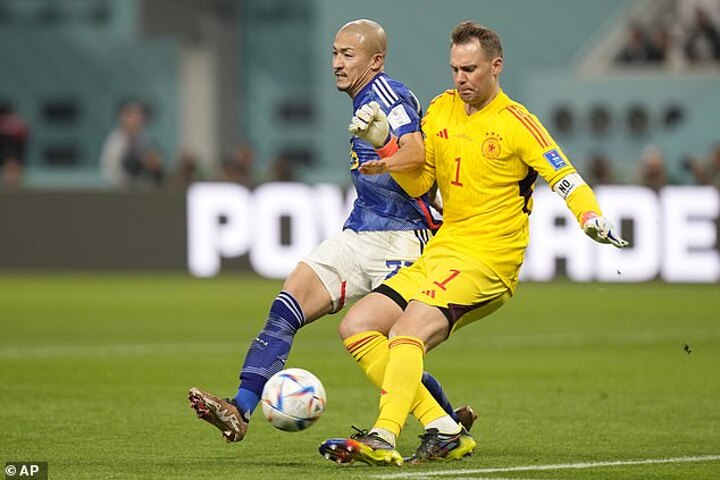
'The tournament director went to the English team and talked about multiple rule violations and threatened with massive sporting sanctions without specifying what these would be,' he said.
Simon, who did not specify if he was referring to local organisers or FIFA in his reference to the tournament director, said the other six nations then decided to 'show solidarity' and not wear it.
'We lost the armband and it is very painful but we are the same people as before with the same values. We are not impostors who claim they have values and then betray them,' he said.
'We were in an extreme situation, in an extreme blackmail and we thought we had to take that decision without wanting to do so.'
It was revealed today that FIFA allegedly sent six officials to the England football team's headquarters on the day of their Qatar World Cup match against Iran and threatened them with drastic sanctions if players wore the 'OneLove' armbands.
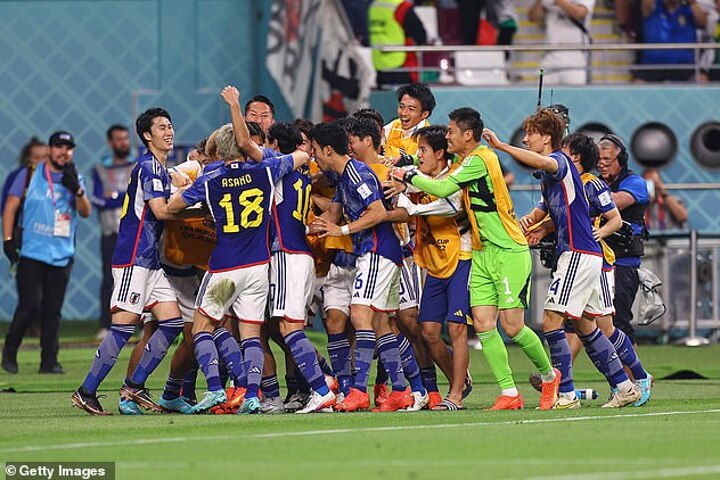
Meanwhile, Denmark has proposed a blanket withdrawal from FIFA alongside other UEFA nations over the row. Danish FA chief executive Jakob Jensen said, however, it would not go to the Court of Arbitration for Sport without exhausting other options.
Further underlining tensions at the tournament over the issue, Belgium's Jan Vertonghen said on Tuesday in Qatar that he was 'afraid' to talk about human rights.
This came after FIFA rejected the the Belgium team's away strip because of the word 'Love' in the collar.
More to follow
